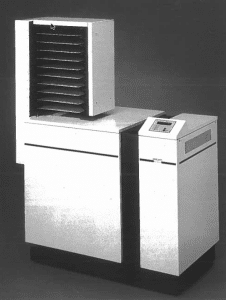>
At one point, I was named one of the hundred most influential people in the IT industry. It may have applied to the other 99. Here’s the real story.
In the late 1990s, I moved to southern Germany, from where I was responsible for Damgaard’s activities in the German-speaking markets. On my way home from Copenhagen to Stuttgart on a grey December evening in 1999, I read the latest issue of the Danish edition of Computerworld. To my great surprise, I discovered that my picture was on the front page of the Millennium supplement.
Together with 99 others, my face was part of a picture mosaic with the hundred supposedly most influential people in the Danish IT industry. The explanation inside the magazine said that from May 1990 to May 1993, I had been the managing director of Data General Corporation’s Danish subsidiary. That, according to Computerworld, made me one of the most influential people in the Danish IT industry.
Please let me reveal that I was not. Yes, I had been the country manager at Data General A/S, just not very influential. In fact, not at all. In any way.
Data General

Now, thirty years later, I can disclose that I took the job at Data General primarily for the money. And because it would make me a managing director before I turned forty. A vanity motive, but also an essential contribution to my resume. This is what I thought at that time.
When you are in a job and consider taking on a new one, it’s because something pulls and something pushes! That was also the case here.
In the spring of 1989, a headhunter, looking for candidates for an open position as country manager for the Danish subsidiary of an American company, approached me. At that time, I received such inquiries regularly. However, since I had no plans to work for a foreign company (been there – done that), I could usually say ‘no thanks’ right away. But Mercante, the Danish startup where I was sales and marketing director, was in trouble. We had severe product problems, were running out of money, and bankruptcy could be the very likely outcome. Therefore, I did not decline straight away but took the first meeting.
At the end of the 1980s, Data General, in line with all the other minicomputer companies, struggled. Internationally, and also in Denmark, they faced declining sales and profits. Demand had shifted towards PCs, networks and software. The market for minicomputers with proprietary operating systems had shrunk. By the time I entered the scene, Data General was switching to a new series of servers and workstations based on UNIX. Great products, but it was a completely different ball game.
After meeting several times at different places across Europe, I sensed that I was probably their favourite candidate. However, Data General was not high on my hit list and did not fit my plans for the future. Working for a Danish company with international assignments was my ideal scenario, so I had started looking for such opportunities. At the same time, however, I kept the pot boiling with Data General. When July came, they threw a proposal on the table which exceeded everything I had ever seen. I politely declined, which made them improve the offer.
Please allow me to pass on a piece of advice. Don’t get too hung up on a high salary! I took the job, was generously paid, and had three horrible years. The same was true of my employees, for whom I must have been one of the worst bosses they have ever had. If you believe that you get the best managers by offering the highest salaries, this story will not confirm such a theory. Big money may distort your perception of reality and affect your common sense.
A misleading audition
It quickly dawned on me that I was miscast for the job as managing director for Data General A/S. It was a tedious job, but the handsome remuneration package and the prospect of stock options and huge bonuses made it hard to admit it and quit.
I initiated a large-scale strategy project that involved all employees but forgot that they had all been much longer with the company than me. They were not interested in my strategy ambitions but preferred to attend to their jobs. Not that they were unengaged, far from it. They had just seen too many directors who, in the absence of something meaningful to do, launched fancy projects. The strategy project ran into the sand. Partly because there was no support among the employees and partly because there was no overall corporate strategy to which we could hook up the local version. Sell more computers, that was the strategy.
A lucky punch
Contrary to what Computerworld’s research had uncovered (probably via the Danish company register), I started the job as early as October 1st, 1989. As such, I landed right at the beginning of a new fiscal year, where I had not been part of the budgeting process. However, with a very high fixed salary and a guaranteed bonus, I agreed to take responsibility for the budget. Had I not done so, they should have fired me immediately. You can’t have a managing director who doesn’t take charge of the shop and doesn’t believe in the budget.
In the middle of the fiscal year, Data General again had to report declining sales and profits on a global level. Therefore, a bulletin was issued by top management with the promise of additional bonuses and more stock options if we could deliver on our budgets. They feared that many country managers, who realised that they could not reach their budgetary targets, would become demotivated or start pushing revenue into the following financial year.
In Denmark, we had a large customer, the Lindø shipyard. At the end of 1989, they decided to acquire a new design system for their engineers. That plan was not known to us when the budget was prepared. However, it enabled Data General Denmark, immediately after my appointment, to deliver results that far exceeded expectations. The credit for the order should go to our sales manager, John Davis. He performed the groundwork before I joined the company; thus, I had no share in that project.
Enjoying early spring in Hawaii in 1990, where Data General held its annual Million Dollar Club, I was pleased to see that Denmark was the best-performing country so far. I got many a pat on the shoulder and appreciative words from management and colleagues. I humbly referred to my talented staff. That’s what we all do in such situations, but this time it was more appropriate than ever.
Be careful exceeding your budget
Everyone, who has had revenue responsibility in a large international organisation, knows that care must be taken not to deliver too good results. If your results are way better than your budget, then you will be suspected of sandbagging and the expectations for the following year will rise accordingly.
In the autumn of 1990, however, the situation for Data General Corporation was to set budgets for 1990/91, which could be met or exceeded. It was not a matter of aiming for the stars and then landing on the moon. During the conversion from the old proprietary minicomputers to new UNIX-based systems, it was not so crucial to show growth and profits. Demonstrating that the business was under control and that management was capable of correctly estimating the most important key figures were much more critical. Being able to comply with its announcements to the stock exchange had the highest priority. Coming through just a little better than announced would be great.
In the fall of 1990, I, along with the other country managers, was summoned to Boston at short notice to present our plans and budgets for the coming fiscal year. Together with my sales manager, John Davis, we came up with a budget that we knew for sure we could reach. The revenue target was somewhat below the 1989/90 result, which was due to extraordinary circumstances. But again, Lindø Shipyard’s investment plans would ensure that we reached our goal. So with peace of mind, I buckled up in my business class seat and took off for Boston.
Upon arriving in our hotel in Westborough (a suburb of Boston), we were asked to meet with the top management team at the Executive Briefing Center the following day at 10 am. Here, all the country managers sat like ducks in a row, waiting for the cross-examination. The first to emerge from the purgatory was ash grey in the face. From the slow progress, I could see that it would hardly be my turn until the late afternoon, so I went back to the hotel, changed and settled in at the swimming pool with a good book. At 4 pm, my Norwegian colleague called and said that I should hurry up because now they had started with the Nordic countries. I showed up precisely, as my name was called out.
It took five minutes. All I needed to do was explain how I would secure my numbers. I told them the truth and explained that we had coverage for the numbers in our existing customer base. Fine, they said, thank you and please send in the next one. Relieved, but also somewhat puzzled, I walked out the door.
Why on earth should I travel to Boston and waste five minutes on a meaningless creed? I should because all country managers should. When it took only five minutes, it was because the Danish contribution was so small that it did not make a big difference and because I had uttered the magic words – from the existing customer base. The next day, before departure, we were each given a small envelope with a new portion of stock options.
When all hell broke loose
My best memories from the time with Data General was from when the shipyard experienced problems with their IT systems. Over a hundred engineers worked daily on designing oil tankers and container ships for the Maersk company (A. P. Moeller). The software they used was provided by Hitachi Zosen in Japan, while the hardware came from us.
At a time when the shipyard was working under a high time pressure to supply several double-hull tankers, it happened that the IT systems suddenly crashed. The software did not save the users’ data at regular intervals, which was why the entire production since the last backup the night before was lost.
After losing several days of production, we had to do something serious to find the cause of the problem. It could potentially lie in many places, and it was by no means a given that it was a Data General problem. However, I decided to disregard speculating in placing the responsibility and instead threw all resources into isolating and reproducing the phenomenon so that it could be resolved. Once the source of error was found and eliminated, we could discuss who should pay for what.
We posted a system analyst on-site permanently. He coordinated all activities, including ensuring that after each incident, a dump of the system’s memory was transferred to tape and immediately sent off (by courier) to our R&D folks in Boston for further analysis. With each crash, the design work on the ships was delayed and, incidentally, caused great frustration with the shipyard engineers. Delaying the delivery of the vessels to Maersk was out of the question. The penalties were exorbitantly high and would also severely affect the yard’s reputation and competitive position. I saw it as my most important task to help ensure the shipyard’s ability to deliver on time.
It took us over three months to locate the error which was caused by loose connections to the memory cards in our servers. The situation was not made easier by the software’s inability to regularly store user data. Still, it was ultimately our gear that caused the problem.
As expected, there was a subsequent fight over the bill for the extra costs. However, overall, Data General came out of the crisis stronger because we had thrown everything in to fix the problem. When the shipyard’s top boss asked if there was anything he could do to relieve the pressure, I asked that our chief executive be invited to the next launch. He was, and in the spring of 1992, I went to pick up Ron Skates and his wife at Kastrup Airport and escort them to the Lindø shipyard, where he was introduced to Mr Møller himself, who thanked him for the effort.
Every supplier occasionally makes mistakes. We are happy to keep those who throw everything into getting them resolved. That is why we came out of the crisis in a stronger position.
Nothing lasts forever
1990/91 was another excellent year for Data General in Denmark, but then our luck ran out. We could foresee limited investments from our existing customers in the coming year. The primary revenue source would be from the sale of new UNIX machines to new customers, and it was hard to predict how this would develop.
We had to be very careful, not promising too much revenue. Which meant that we also had to be prepared to cut costs (= fewer or cheaper employees). I quickly realised that even if you have the title of managing director, you do not have much to say in a subsidiary. I could forget all about my ambitions of running the business as was it my own. There was politics on every level, and everyone was attending to their darlings. I planned to reduce all administrative overhead to a minimum, remove a management layer in the small sales department and take on the role of sales manager. That plan was not approved and, instead, I was given a budget in which I did not believe. They called it a management objective.
One early afternoon in mid-August 1992, my secretary came in with a message that my boss was on a plane from Stockholm and would be in the office within a few hours. I was going to stay until we had had the opportunity to talk. Now I saw the writing on the wall and relieved I could look forward to getting my pink slip and a golden handshake.
And that’s what happened. After a very brief conversation, I could pack my few personal belongings in a cardboard box and leave.
We opened a bottle of wine at home that night and celebrated the event.
1991/92 did not turn out to be a good year for Data General in Denmark or elsewhere for that matter. Still, management had shown resolution and fired the director. It was a sensible thing to do in every way.
A well-paid puppet on a string
The title of managing director may sound impressive. However, when it labels the job of being the manager of a subsidiary with twenty employees in an international group with thousands of employees, it is not.
In any international context, Denmark is a small market. As long as you deliver on your budgets and keep a low profile, then what is going on in Denmark is of little importance. In most cases, Denmark is just a drop in the ocean or a rounding off of the figures.
Most foreign subsidiaries in Denmark are registered as an ApS (small company), which doesn’t require a board of directors. You don’t need that for tactical sales and service activities. Subsidiaries registered as an A/S (as Data General was), mostly have pro forma people on the board.
At Data General A/S (where I never experienced a single board meeting), I reported to the Swedish country manager (who was also responsible for the Nordic countries). He, in turn, reported to the European manager, who reported to the international sales director who reported to the CEO. The Danish controller and her people reported to the Swedish controller. The service department also had a line function out of the country. Only sales and professional services reported to me. There was a good sales manager, so even though sales were my core competence, there wasn’t much for me to do here. In reality, I was an overpaid marketing manager.
Our mission at Data General A/S was to sell as many computers as possible in Denmark. How we did it and to whom, that was up to us to figure out. I do not recall that at any time we should provide input to our American parent company about the special conditions in the Danish market. The marching order was simple: Here are the boxes, now go out and sell them. When asked about the overall market strategy, I was told that our boxes were better than the others’ boxes.
What I learned
On the day I was fired, I was home early and did the cooking. After putting the kids to bed, my wife and I shared the rest of the wine and took stock of the three years at Data General.

We had been to Hawaii once (the trip in 1992 was cancelled because of the US war in Iraq). Twice at the magnificent Interalpen Hotel in Seefeld, Austria. We had not changed our lifestyle. Hence, the bank account looked good, and we had poured over a million (DKK) into the retirement fund. The firing was associated with a golden handshake of six months salary with full compensation for the bonus. I was released with immediate effect, and I could keep the company car until the end of the year. We were in no way in a tight situation.
I had learned that the job as a subsidiary director in a large foreign group did not fit my profile. When reporting to Stockholm, that reports to Paris, that reports to a Boston sales executive that reports to the company’s CEO, one is very far away from the strategic decisions. A job without any influence on the company’s overall strategy seemed boring to me.
In Data General, I was an imperfect boss in many ways. I couldn’t translate my attractive terms of employment into something that made sense to my staff. “Sell more boxes” was a mission I had trouble identifying with, and it affected my attitude and behaviour.
The firing was justified in every way. It was the right action. For me, too.
As far as business journalism is concerned, I learned that you have to take lists of influential and powerful people, promising talents, etc. with a great deal of salt. As head of Damgaard’s activities in the German-speaking countries, one could well argue that I was somewhat important. These are big markets with close to 100 million people that hold enormous potential. But it was not the role that justified my presence on the front page. It was my Data General adventure. I did manage to get some PR coverage in both Computerworld and other papers. However, claiming that I was among the one hundred most influential people in the industry was a gross exaggeration.
The next job was to be a project
With my new experiences, I could very accurately describe what a new job position should include. I decided that it was not a job I was looking for but a project. I wanted to go back to international business development, and on September 1st, 1992, I started with the company Dansk Data Elektronik (DDE).
That’s a story I will tell another day.
This is the second article in the series about my life in the IT industry. I go behind the headlines and the glossy print and tell what life in the trenches truly looks like.









